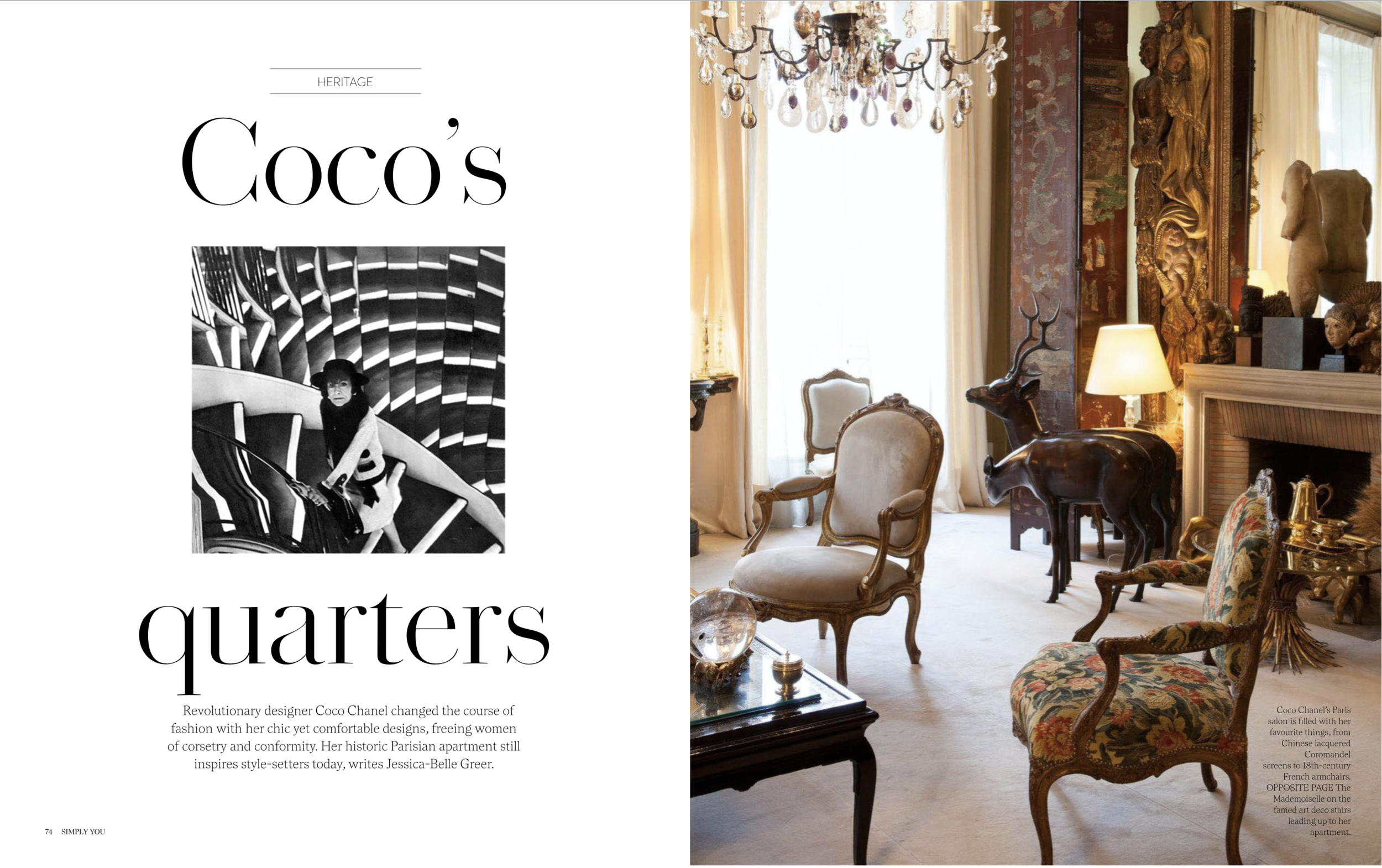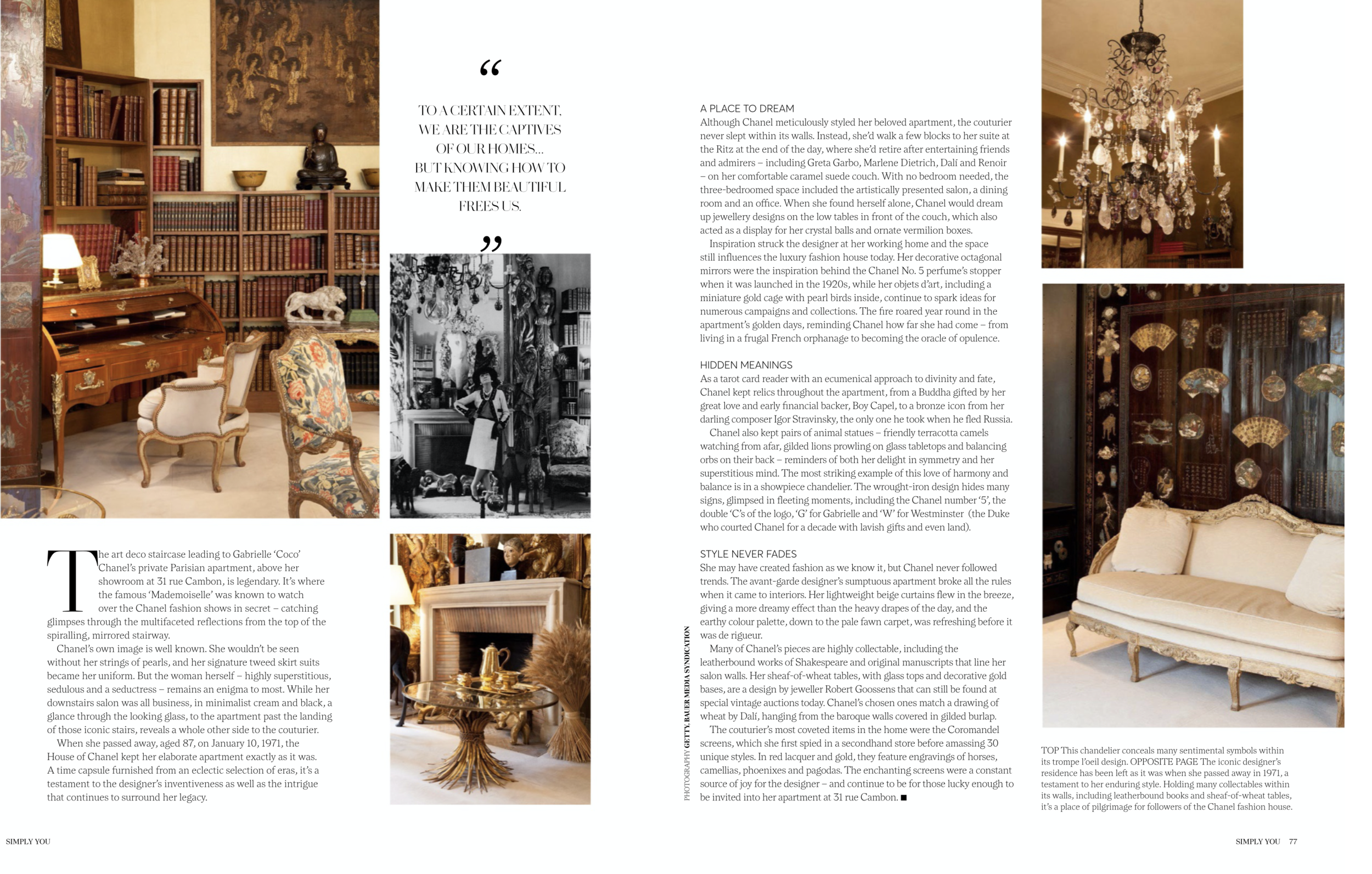Coco’s quarters
Revolutionary designer Coco Chanel changed the course of fashion with her chic yet comfortable designs, freeing women of corsetry and conformity. Her historic Parisian apartment still inspires style-setters today, writes Jessica-Belle Greer.
Simply You - Issue 3, 2019
The art deco staircase leading to Gabrielle ‘Coco’ Chanel’s private Parisian apartment, above her showroom at 31 rue Cambon, is legendary. It’s where the famous ‘Mademoiselle’ was known to watch over the Chanel fashion shows in secret – catching glimpses through the multifaceted reflections from the top of the spiralling, mirrored stairway.
Chanel’s own image is well known. She wouldn’t be seen without her strings of pearls, and her signature tweed skirt suits became her uniform. But the woman herself – highly superstitious, sedulous and a seductress – remains an enigma to most. While her downstairs salon was all business, in minimalist cream and black, a glance through the looking glass, to the apartment past the landing of those iconic stairs, reveals a whole other side to the couturier.
When she passed away, aged 87, on January 10, 1971, the House of Chanel kept her elaborate apartment exactly as it was. A time capsule furnished from an eclectic selection of eras, it’s a testament to the designer’s inventiveness as well as the intrigue that continues to surround her legacy.
A place to dream
Although Chanel meticulously styled her beloved apartment, the couturier never slept within its walls. Instead, she’d walk a few blocks to her suite at the Ritz at the end of the day, where she’d retire after entertaining friends and admirers – including Greta Garbo, Marlene Dietrich, Dalí and Renoir – on her comfortable caramel suede couch. With no bedroom needed, the three-bedroomed space included the artistically presented salon, a dining room and an office. When she found herself alone, Chanel would dream up jewellery designs on the low tables in front of the couch, which also acted as a display for her crystal balls and ornate vermilion boxes.
Inspiration struck the designer at her working home and the space still influences the luxury fashion house today. Her decorative octagonal mirrors were the inspiration behind the Chanel No. 5 perfume’s stopper when it was launched in the 1920s, while her objets d’art, including a miniature gold cage with pearl birds inside, continue to spark ideas for numerous campaigns and collections. The fire roared year round in the apartment’s golden days, reminding Chanel how far she had come – from living in a frugal French orphanage to becoming the oracle of opulence.
Hidden meanings
As a tarot card reader with an ecumenical approach to divinity and fate, Chanel kept relics throughout the apartment, from a Buddha gifted by her great love and early financial backer, Boy Capel, to a bronze icon from her darling composer Igor Stravinsky, the only one he took when he fled Russia.
Chanel also kept pairs of animal statues – friendly terracotta camels watching from afar, gilded lions prowling on glass tabletops and balancing orbs on their back – reminders of both her delight in symmetry and her superstitious mind. The most striking example of this love of harmony and balance is in a showpiece chandelier. The wrought-iron design hides many signs, glimpsed in fleeting moments, including the Chanel number ‘5’, the double ‘C’s of the logo, ‘G’ for Gabrielle and ‘W’ for Westminster (the Duke who courted Chanel for a decade with lavish gifts and even land).
Style never fades
She may have created fashion as we know it, but Chanel never followed trends. The avant-garde designer’s sumptuous apartment broke all the rules when it came to interiors. Her lightweight beige curtains flew in the breeze, giving a more dreamy effect than the heavy drapes of the day, and the earthy colour palette, down to the pale fawn carpet, was refreshing before it was de rigueur.
Many of Chanel’s pieces are highly collectable, including the leatherbound works of Shakespeare and original manuscripts that line her salon walls. Her sheaf-of-wheat tables, with glass tops and decorative gold bases, are a design by jeweller Robert Goossens that can still be found at special vintage auctions today. Chanel’s chosen ones match a drawing of wheat by Dalí, hanging from the baroque walls covered in gilded burlap.
The couturier’s most coveted items in the home were the Coromandel screens, which she first spied in a secondhand store before amassing 30 unique styles. In red lacquer and gold, they feature engravings of horses, camellias, phoenixes and pagodas. The enchanting screens were a constant source of joy for the designer – and continue to be for those lucky enough to be invited into her apartment at 31 rue Cambon. ■
For more: A short history of Balenciaga on FQ.co.nz.


